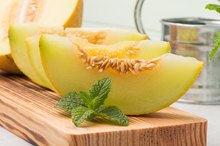What does fact checked mean?
At Healthfully, we strive to deliver objective content that is accurate and up-to-date. Our team periodically reviews articles in order to ensure content quality. The sources cited below consist of evidence from peer-reviewed journals, prominent medical organizations, academic associations, and government data.
- Centers For Disease Control and Prevention; Carbohydrates; February 2011
- National Digestive Diseases Information Clearinghouse; Your Digestive System and How It Works; April 2008
- "The Journal of Nutrition"; Class 2 Resistant Starches Lower Plasma and Liver Lipids and Improve Mineral Retention in Rats.; H.W. Lopez, et al.; April 2001
- "The Journal of Nutrition"; Class 2 Resistant Starches Lower Plasma and Liver Lipids and Improve Mineral Retention in Rats.; H.W. Lopez, et al.; April 2001
The information contained on this site is for informational purposes only, and should not be used as a substitute for the advice of a professional health care provider. Please check with the appropriate physician regarding health questions and concerns. Although we strive to deliver accurate and up-to-date information, no guarantee to that effect is made.
Carbohydrates in Potato Starch
Potatoes are full of starch, which is a type of complex carbohydrate. They often get a bad reputation for their high carb content, but the carbs in potatoes are actually a "good" type that take a while for your body to break down. While you need carbohydrates in your diet, going overboard by consuming too much can lead to weight gain.
Types of Carbohydrates
In general, carbohydrates can be categorized as either simple or complex. All types of carbs, except for fiber, eventually deconstruct into simpler forms and absorb as glucose, the primary energy source for all cells throughout your body. Simple carbohydrates, including fruit sugar, or fructose, milk sugar, or lactose, and table sugar, or sucrose, have a straight structure that metabolizes quickly in one simple step in your small intestine. Complex carbohydrates, such as starch, have a complicated branched structure that undergoes two distinct steps before absorption as glucose. First, saliva breaks the complex molecule into a smaller form called maltose. Next, enzymes in your small intestine further break down maltose into simpler molecules so it can absorb as glucose. Fiber is a unique type of complex carbohydrate since it is not broken down into glucose. Instead, fiber stays intact and helps push food through your body.
- In general, carbohydrates can be categorized as either simple or complex.
- Complex carbohydrates, such as starch, have a complicated branched structure that undergoes two distinct steps before absorption as glucose.
Carb Content in Potatoes
The Carbohydrates in Kidney Beans
Learn More
You have a variety of potatoes to choose from, depending on your taste preference. Types of potatoes include sweet potatoes, russet, Yukon gold, new potatoes, fingerling, red or purple potatoes. All types of potatoes provide complex carbohydrates in the form of starch and fiber. One serving of potato is about 3 oz. or one-fourth of a large potato. This serving provides 80 calories and 15 g of carbs in the form of starch.
- You have a variety of potatoes to choose from, depending on your taste preference.
- This serving provides 80 calories and 15 g of carbs in the form of starch.
Calories in Carbohydrates
Carbohydrates should comprise about 45 to 65 percent of the total calories in your diet, reports the McKinley Health Center. Starch carbohydrates in potatoes provide 4 calories per gram, totaling 60 calories from carbohydrates. If you normally follow a 2,000-calorie diet, the amount listed on food nutrition labels, you need around 225 to 325 g of carbs throughout the day.
Benefits of Potato Starch
Oats & Carbohydrates
Learn More
Researchers at the Unit Laboratory for Innovation in Cereals in France published a study in "The Journal of Nutrition" in 2001 comparing benefits of high amylose corn starch and raw potato starch in rats 2. Researchers observed that either type of starch has similar benefits, including lowered triglycerides and total cholesterol, as well as enhancing your body's ability to absorb zinc, magnesium, calcium, iron and copper. Cholesterol benefits may occur because complex carbs in starch take an extended period of time for your body to break down, slowing the absorption of cholesterol into your bloodstream.
Related Articles
References
- "Choose Your Foods: Exchange Lists for Diabetes"; American Dietetic Association, 2008
- "The Journal of Nutrition"; Class 2 Resistant Starches Lower Plasma and Liver Lipids and Improve Mineral Retention in Rats.; H.W. Lopez, et al.; April 2001
- Potatoes, Russet, flesh and skin, baked. FoodData Central. U.S. Department of Agriculture. Published April 1, 2019.
- King JC, Slavin JL. White potatoes, human health, and dietary guidance. Adv Nutr. 2013;4(3):393S-401S. doi:10.3945/an.112.003525
- MacDonald-Clarke CJ, Martin BR, McCabe LD, et al. Bioavailability of potassium from potatoes and potassium gluconate: A randomized dose response trial. Am J Clin Nutr. 2016;104(2):346-53. doi:10.3945/ajcn.115.127225
- Vitamin C: Fact Sheet for Health Professionals. National Institutes of Health Office of Dietary Supplements. Updated February 27, 2020.
- Liu RH. Health-promoting components of fruits and vegetables in the diet. Adv Nutr. 2013;4(3):384S-92S. doi:10.3945/an.112.003517
- Slavin JL. Carbohydrates, dietary fiber, and resistant starch in white vegetables: links to health outcomes. Adv Nutr. 2013;4(3):351S-5S. doi:10.3945/an.112.003491
- Eke Gungor H, Uytun S, Murat Sahiner U, Altuner Torun Y. An unexpected cause of anaphylaxis: potato. Eur Ann Allergy Clin Immunol. 2016;48(4):149-52.
- Tolkki L, Alanko K, Petman L, et al. Clinical characterization and IgE profiling of birch (Betula verrucosa)--allergic individuals suffering from allergic reactions to raw fruits and vegetables. J Allergy Clin Immunol Pract. 2013;1(6):623-31.e1. doi:10.1016/j.jaip.2013.07.010
- Acrylamide and cancer risk. National Cancer Institute. Updated December 5, 2017.
- Best vegetables for arthritis. Arthritis Foundation.
- Barceloux DG. Potatoes, tomatoes, and solanine toxicity (Solanum tuberosum L., Solanum lycopersicum L.). Dis Mon. 2009;55(6):391-402. doi:10.1016/j.disamonth.2009.03.009
Writer Bio
Melodie Anne Coffman specializes in overall wellness, with particular interests in women's health and personal defense. She holds a master's degree in food science and human nutrition and is a certified instructor through the NRA. Coffman is pursuing her personal trainer certification in 2015.









